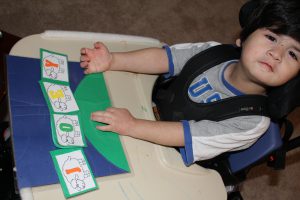 This is the first in a series of posts on the importance of presuming competency, and strategies to help us.
This is the first in a series of posts on the importance of presuming competency, and strategies to help us.
If you want to see Joey’s smile, the first step is to look him directly in the eyes and talk to him in a voice you would use with any three-year-old. Next, ask him questions that require a response, and pause to let him attempt to answer. Nod at his answer, and then pause, waiting for him to see if he will expand on that idea by pointing, gesturing, or by glancing somewhere else in the room. Don’t talk to his parents about him in front of him. Talk directly to him. Presume his competence, even if he does not jump at the occasion to engage, or if he looks uninterested in your words that day.
Presuming competency refers to the idea that when we work with children with disabilities, we assume they have the ability to think, learn, and understand. We believe that although the child does not have the ability to tell us what he is thinking, this does not mean that the child is not thinking. This is also referred to as the least dangerous assumption as it would be far more dangerous to assume a child who does not speak is incapable of thought, than to assume the child is deep in thought, but just unable to say it aloud. It would be better to be wrong in your assumption of a child’s high abilities, than to assume a child cannot do something he is capable of doing when given the right support.
Joey is perhaps the greatest example of the importance of this assumption that I have ever had the opportunity to work with. He surprises me daily with his ability to correctly answer questions that I know my own three-year-old would not be able to correctly answer. Yet it is so easy to not give him the wait-time and support needed to show what he is capable of, or to simply assume that because he does not speak, he cannot identify his numbers or letters.
For Joey, presuming competency often means treating his selected words on the eye-gaze device as meaningful and intentional, instead of assuming he is randomly choosing words that coincidentally are correct. Or sitting quietly to wait for him to select the words he wants to use, instead of simply assuming he has nothing to share. Assuming that when he is saying “wuh, wuh, wuh” he is working hard at telling me he wants something. And more importantly, it means listening for those subtle utterances that show he is attempting to speak since it can be so easy to overlook them. Presuming competency means talking directly to him, and not his caregivers, and to presenting him with age-appropriate opportunities like using a calendar, or learning his alphabet.
Yet presuming competency is often particularly difficult to do with students like Joey, who are unable to fully control their bodies, and to speak. It is easy to assume a child is unable to understand us when they do not engage with us in a typical fashion. But when we make assumptions of what a child cannot do, we limit our expectations and what we expose the child to, never giving the child the opportunity to even try. We never set the stage for success, and so the child will meet our low expectations.
I often wonder why we have such a hard time presuming competence when we work with children with disabilities. Are we protecting ourselves in case it turns out that we are wrong, and the student is not able to independently do what we want them to do? Are we scared of other professionals thinking that our judgement is clouded, and that we are not able to see our student’s weaknesses? Why are we so quick to see what students do wrong, yet hesitate to give them credit for what they do right?
*If you are looking for a way to better understand the importance of presuming competency, read Out of My Mind. Although it is a fictionalized novel for middle grade readers, it tells the story of a brilliant child with cerebral palsy, who, like Joey, is unable to walk and speak. Unlike Joey, it is not until much later in her life that she is able to access an augmentative, alternative communication device, and begin to prove to those around her that she is intelligent and capable. Reading this book will change the assumptions you make about those around you.


